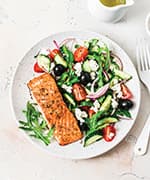Life Extension Magazine®
Mediterranean Diet Can Lower Risk of Sudden Cardiac Death by 25%-26%
A lower risk of sudden cardiac death is associated with greater adherence to a Mediterranean diet, a study in the Journal of the American Heart Association reported.* The study also found a trend toward a higher risk of sudden cardiac death associated with greater intake of a Southern dietary pattern.
The Mediterranean diet foods included vegetables, fruits, legumes, cereals, and fish.
The Southern pattern included added fats, fried food, eggs and egg dishes, organ meats, processed meats, and sugar-sweetened beverages.
Among 21,069 men and women aged 45 years and older, 401 sudden cardiac deaths occurred during an average 9.8 years of follow-up. People whose Mediterranean diet scores placed them among the top one-third of participants had a 25%-26% lower risk of sudden cardiac death than subjects whose scores were among the lowest third.
People whose Southern dietary pattern score was among the top quarter of participants had a 46% higher risk of sudden cardiac death than those among the lowest quarter.
Editor’s Note: The protective effect of the Mediterranean diet was limited to participants with no history of coronary heart disease at the beginning of the study.
* J Am Heart Assoc. 2021 Jul 6;10(13): e019158.
Better Response to Stress with French Oak Wood
A group of nurses who received supplements containing an extract of French oak wood showed improvement in their responses to stress, according to a pilot study reported in Minerva Medica.*
Participants were evaluated for signs of stress and fatigue in addition to levels of oxidative stress.
After four weeks, assessed stress factors significantly improved in the group that received 300 mg per day of French oak wood compared to the beginning of the study, and compared to the matched control group.
"The supplementation significantly improved the objective perception of fatigue in comparison with controls. A practical professional score evaluation provided an indication of professional attitude and stamina, in difficult, stressful working conditions under continuous pressure," researchers stated.
Editor’s Note: The nurses were evaluated as part of a cardiovascular screening program.
* Minerva Med. 2021 Sep 20.
How Omega-3 Helps Protect Against Depression
Research reported in Molecular Psychiatry contributes to an understanding of omega-3 fatty acids’ ability to combat depression.*
In cells derived from the brain’s hippocampus, treatment with the omega-3 fatty acids EPA and DHA prevented the increase in cell death and decrease in neuron formation that would have otherwise resulted from exposure to inflammatory cytokines.
An in vitro study was replicated in a clinical study among a small sample of 22 individuals with Major Depressive Disorder. They received 3 grams of EPA or 1.4 grams of DHA daily for 12 weeks.
Either fatty acid (EPA or DHA) was associated with an increase in lipid mediator metabolites and improvement in depressive symptoms.
Editor’s Note: "In summary, our study confirms and extends previous evidence for the antidepressant, anti-inflammatory and neuroprotective abilities of EPA and DHA," the authors stated.
* Mol Psychiatry. 2021 Jun 16.
Dietary Supplements Linked to Improved Prognosis for Breast Cancer Patients
A meta-analysis published in the journal Cancers found associations between improved breast cancer outcomes and the intake of multivitamins and other nutrients.*
Sixty-three studies including a total of 120,167 breast cancer patients were analyzed.
For participants in studies that evaluated the effects of multivitamins, the risk of mortality was 12% lower, and 17% lower among those who took antioxidant supplements.
Studies that examined vitamin C’s effects on breast cancer-specific mortality showed that vitamin C intake amount among the top 25% was associated with an 18% lower risk of death.
Editor’s Note: "Furthermore," the authors concluded, "we performed subgroup analyses by menopausal status and dietary or supplementary micronutrient intake. Most trends were similar to the main findings; in particular, the vitamin C, vitamin D, and vitamin E supplements decreased the risk of mortality."
* Cancers. 2021 Oct 23.





